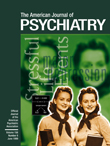To the Editor: Richard Balon, M.D., and colleagues
(1) recently pointed out the existence of obstacles in enrolling foreign medical school graduates into residency training positions in psychiatry, probably because of discrimination on the basis of an applicant’s name and medical school of graduation. Was the citizenship or immigration status of the foreign applicant indicated in the letter he received, in order to make a valid comparison?
Israeli citizenship is guaranteed automatically to every Jew and his or her family, no matter the country of birth or residence, according to the Law of Return. The current wave of mass immigration from the former Soviet Union, which started in 1989, includes a disproportionately high number of physicians—280 per 1,000 immigrants—a figure that is 10 times higher than the existing proportion of physicians in Israel. The cultural, socioeconomic, and professional problems faced by immigrants become more pronounced among physicians because of the inevitable loss of status, the long requalification and licensing process, and high distress and demoralization
(2).
In the field of mental health, a parallel process is taking place: an interaction between the internal vulnerability of recent immigrants and acculturation trouble has increased the number of people asking for help
(3) and demanding better-trained mental health professionals speaking their languages and acquainted with their culture. Recruiting, training, and employment of immigrant doctors in order to ensure adequate diagnosis and treatment has become a serious challenge to medical services. In our state mental hospital, which is the largest in Israel and has university affiliation, foreign medical graduates presently comprise 75% of its residents, due not only to a certain shortage in the influx of local graduates into psychiatry as a postgraduate choice but to the necessity of absorbing foreign medical graduates.
As a partial solution to current problems, the Israeli Ministries of Health and Absorption, as well as nongovernmental organizations (Joint Distribution Committee, Jewish Agency), provide initial financial support and educational programs, like Balint groups and retraining courses, to improve the psychosocial skills and self-efficacy of immigrant physicians
(4).
Because of this experience, we think that ensuring equal opportunities for residency training and subsequent employment of foreign medical graduates enables coping with probable discrimination between foreign and local psychiatrists, permits an adequate professional adaptation, and provides a better way to care for native and immigrant populations.

